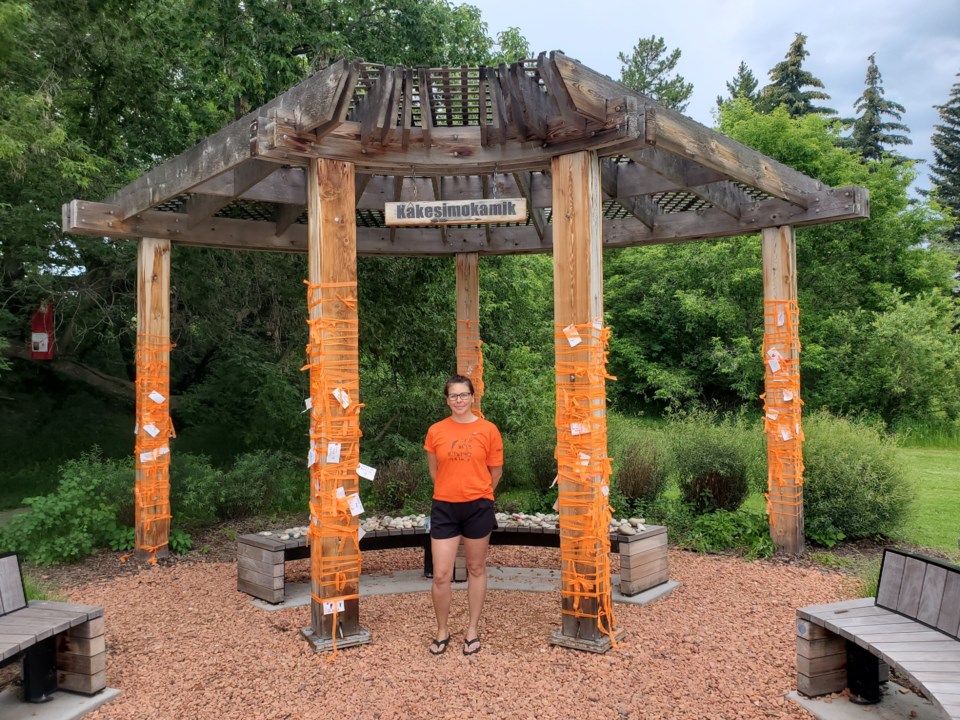On July 1st, St. Albert's Lions Park will once again host a run with a difference.
The Run and Walk for Reconciliation, now in its third year, pays homage to survivors of Canada's residential school system, urging the community to reflect on its colonial history and ongoing impact.
The event's founder, Amanda Patrick, was inspired to act after news broke about the discovery of children's bodies at Kamloops.
"I was feeling a heavy impact emotionally," she said.
"I wanted to do something to honour the children somehow. I thought, what if I got some fellow runners out and we did a run in honour of the children? I posted a video online, and it took off from there. That was when I realized that there were so many others who were feeling the need to do something somehow just like myself. "
Since the inaugural run in 2021, the event has grown significantly, engaging hundreds from St. Albert and beyond. Participants walk or run with an orange ribbon, reflecting on their personal journey towards reconciliation. The route concludes at the St. Albert Healing Garden, where the ribbons are tied to gazebo posts, often accompanied by personal messages.
"The idea is that you run or walk with intention, thinking about what reconciliation means for you personally and how you can make a difference," Patrick says.
She emphasizes the importance of this grassroots event and said something that started from a video posted online has turned into hundreds of people who have stepped out to offer their support to reconciliation.
For many, like repeat runner Tony Kulbisky, the Run and Walk for Reconciliation has become a meaningful Canada Day tradition. Participating for the third consecutive year, he comments on how "the event allowed a lot of people from all walks of life to come together as humans."
Throughout the years, the event has evolved into more than just a symbolic journey. The Run and Walk for Reconciliation also raises funds for indigenous-led initiatives like the Legacy of Hope Foundation, with previous events raising over $8,000 for the Indian Residential School Society.
This year, Indigenous dancers and drummers will conclude the event with a healing song at the Healing Garden.
Patrick stresses that the Run and Walk for Reconciliation is an inclusive, community-led initiative. Despite facing challenges like funding, the event's success can be attributed to the generous support from the community and sponsors. The event will also be backing an Indigenous small business, 220Designs, by selling t-shirts designed by 17-year-old Indigenous youth Chiana Roy, with all proceeds going towards the event's costs.
Acknowledging the support from Metis Local 1904 and dedicated individuals, Patrick believes that this community engagement underscores the importance of continuous conversation and active participation in reconciliation.
“Joanna Campiou from Kipohtakaw, or Alexander First Nation, founder of Hoop of Life Creations Ribbon skirts, traditional knowledge keeper, and powwow dancer has supported the event by sharing her First Nation knowledge and community to us,” says Patrick.
“Her guidance is highly appreciated and her presence contributes so much to the event.”
Kulbisky said events like this provide an opportunity for everyone to be involved and make a difference and said the day has a big impact on the community.
Patrick's hope is that the Run and Walk for Reconciliation will become a staple Canada Day tradition — "a day to celebrate our great country while also remembering and acknowledging the dark parts of our past."
It's a call to action for Canadians to keep the conversation about reconciliation alive and turn this collective intention into measurable change.
Reconciliation is an ongoing process that includes ongoing conversation, Patrick said.
"I truly believe that every single person can make a difference and that every single step can make a difference."



